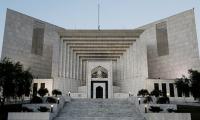LAHORE: Assistance from Saudi Arabia and China has provided some relief to the new government but its foreign exchange needs are so high that it has to seek the IMF that wants government to increase revenues either indirectly or though fair taxation.
A perception has been created in Pakistan that the IMF conditions for a bailout package are very tough and would hurt the poor. Actually, IMF always demanded in all its packages to exploit the actual revenue potential of the country and check corruption that causes leakages almost equivalent to the current tax revenues.
In fact, IMF wants to make sure that the country develops capacity to return back the loans it provided as a lender of last resort. A lender of last resort is the party that agrees to provide loan to a country where every other lender is unwilling to trust it.
It is similar to the loan sharks, widespread in our society, who lend to the poor on unbearable terms.
But the difference between loan sharks and the IMF is that the former is not bothered by the way you consume your loan; he simply wants the borrower to go on paying the high mark-up on monthly basis even if you are unable to pay the principal amount.
The IMF on the other hand suggests ways to increase revenues and plug leakages. In Pakistan’s case, it has been advising government after government to fully document the economy and privatise loss-making public sector companies.
Alternately, it desires that the state improves the efficiencies of public companies to avoid huge losses. In the last thirty years, no government in Pakistan has been able to fulfil these two demands of the Breton Wood lender.
Instead, every government negotiates with it the different ways to increase revenues. If the economy is fully documented, the revenues would automatically double.
However, in the last thirty years we have seen that the informal or non-documented sector of the country enlarging. In the same way the losses of public sector entities also have ballooned from Rs150 billion in 1999 to over Rs1,200 billion now.
Under these circumstances, the IMF is left with no option but to ask the government to raise revenues through indirect taxes that hurt the common man. One fails to understand who the actual culprit is - the IMF or successive governments of Pakistan?
We are sitting on a huge data of seven million tax evaders, but are reluctant to confront them. The bigger tax evaders are from influential segments of the society.
We have arrested so many public figures, but never apprehended a smuggler or tax evader. If the government has evidence of wrong doing by high profile individuals they should not be given notices but put in jails.
Why is government afraid of raiding markets flooded with smuggled goods? Who will check that an item imported at Rs100 that officially costs the importer Rs150 is being sold at Rs1,500?
Is the importer (probably the one indulged in under-invoicing) paying tax on such huge profit? If we succeed in taking action against 25 percent of such tax evaders, it might resolve half of our problems.
We are moving from pillar to post to get the IMF package of $6 billion (Rs840) but the electricity consumers both private and public owe the power distributors over Rs850 billion.
What is stopping us from recovering this amount? Our power losses are ballooning and because of that we are unable to bill electricity worth more than Rs400 billion annually. This is equivalent to around $3 billion.
Pakistan Steel Mill, the biggest in Pakistan, is incurring huge losses while smaller private sector mills are operating in profit. PIA is in doldrums while Air Blue is operating on profit.
The cost of private sector furnace oil run power plants is half the cost of public sector furnace oil-based power plants. Why those responsible for these efficiencies are not nabbed?
Finance Minister Asad Umar has confidently predicted that this would be the last IMF programme for Pakistan. He conveniently forgot that Shaukat Aziz and Ishaq Dar also boasted the same.
Pakistani government would have to muster political will to confront the influential and refrain from marginalising the poor. The devaluation in last six months is already an unbearable tax that they are forced to pay.







